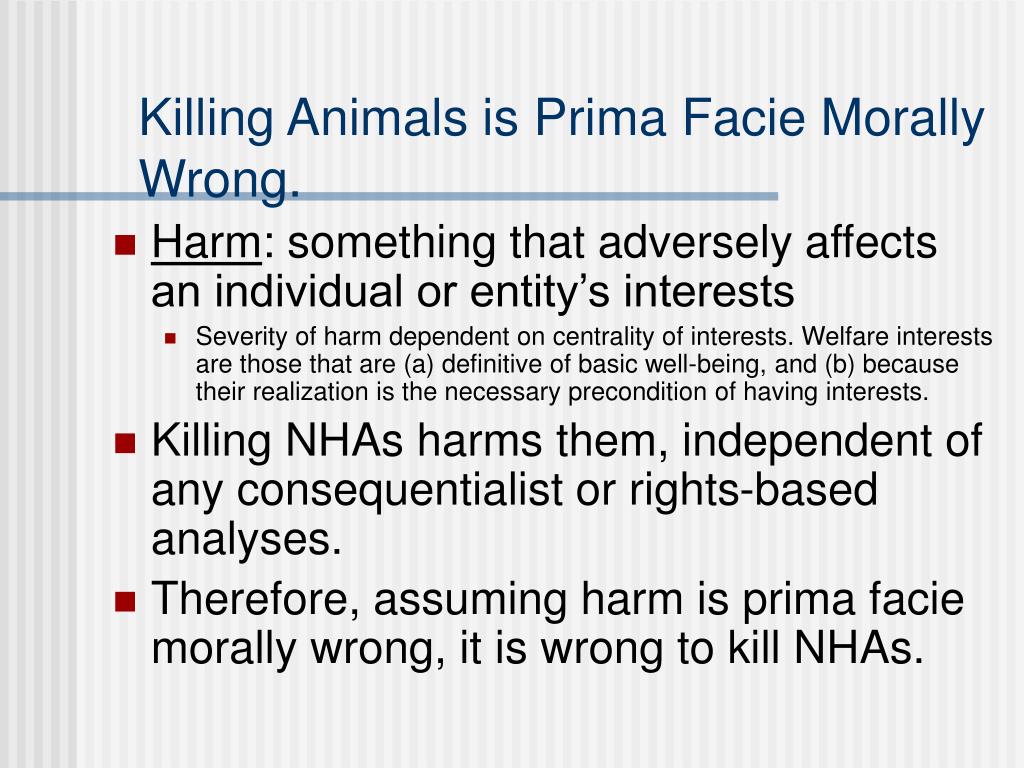In a world increasingly aware of moral complexities, one question remains evergreen: Why is it that the infliction of pain and suffering upon animals is always morally reprehensible? To elucidate this query, we must explore the constructs of empathy, ethical frameworks, and the implications of our actions on fellow sentient beings.
To begin, it is vital to acknowledge the fundamental capacities of animals. Many species display remarkable intelligence, emotional depth, and social structures that mirror human societies. Mammals, birds, and even some reptiles exhibit behaviors that suggest they experience pain not just physically but also psychologically. Has the time not come for us to genuinely consider their welfare as paramount? When we inflict pain, we’re not merely committing an act against a mere object; we are violating the sanctity of a life that possesses intrinsic value.
Delving into moral philosophy, we encounter the principle of utilitarianism, which postulates that the best action is the one that maximizes happiness or minimizes suffering. If we apply this principle to actions involving animals, it becomes evident: the suffering we cause to animals overwhelmingly outweighs any transient benefits we might derive from such actions. For instance, factory farming practices yield profit at the expense of countless sentient lives subjected to abominable conditions. Is this not a glaring violation of moral obligation?
Moreover, deontological ethics, championed by philosophers such as Immanuel Kant, posits that certain actions are inherently wrong regardless of their consequences. Under this framework, the act of beating or hurting animals cannot be justified; it contravenes the notion of treating sentient beings as ends in themselves rather than means to an end. When one commits acts of violence towards animals, it not only infringes upon their rights but also diminishes the moral standing of the perpetrator. It begs the question: To what extent do we compromise our humanity when we inflict harm upon the vulnerable?
The emotional toll inflicted upon animals cannot be overstated. Evidence suggests that animals possess complex emotional lives and form bonds comparable to human relationships. The act of inflicting violence on these creatures leads not only to physical suffering but also to profound psychological distress. A dog, once a loyal companion, may develop anxiety or depression after experiencing brutality. An animal may withdraw, show aggression, or even lose the will to live. This response exemplifies the notion that their well-being is interconnected with our moral choices.
Furthermore, there are societal implications of animal cruelty that go beyond individual cases. The normalization of violence against animals can cascade into a culture where empathy is eroded, leading to a desensitized populace that may extend cruel behaviors towards other humans. Historical patterns reveal that societies that exhibit heightened tolerance for animal cruelty often experience parallel developments concerning human rights abuses. It compels us to ponder: What kind of society do we aspire to create? Are we willing to tether our ethical evolution to the suffering of those who cannot advocate for themselves?
Perhaps one of the most potent arguments resides within the concept of stewardship. Many cultures, religions, and philosophical traditions recognize the human responsibility to care for creation. This perspective positions humans not as dominators of the natural world but as custodians of its myriad inhabitants. Through this lens, the act of harming an animal becomes a dereliction of duty. It involves a betrayal of trust—a violation of the bond we are meant to nurture. When we engage in acts of cruelty, we actively choose to neglect our roles as stewards, signaling a broader disregard for the balance of life that sustains us all.
In contrast, compassionate interactions with animals yield profound rewards. Studies indicate that kindness towards animals fosters empathy in children and adults alike. Engaging in animal welfare efforts not only benefits the animals but also enhances our own moral fabric and emotional intelligence. Imagine a world where reverence for life, in all its forms, defines us. Would not such a paradigm cultivate communities grounded in respect, love, and collaboration? The pathway forward is clear: we must reject cruelty in all forms and commit to a shared existence that honors the lives of all beings.
In conclusion, the act of beating and hurting animals is indefensible from multiple moral perspectives. The infliction of suffering upon sentient beings cannot be justified, as it leads not only to immediate harm but also has far-reaching consequences for society, our ethical integrity, and the emotional landscape of our communities. As we grapple with these moral dilemmas, let us consider what actions genuinely reflect the values we hold dear. A commitment to nonviolence towards animals affirms our standing as empathetic beings, capable of creating a world where all life is cherished. The challenge before us is clear: to embrace compassion as our guiding principle and to advocate tirelessly for those who cannot speak for themselves.








